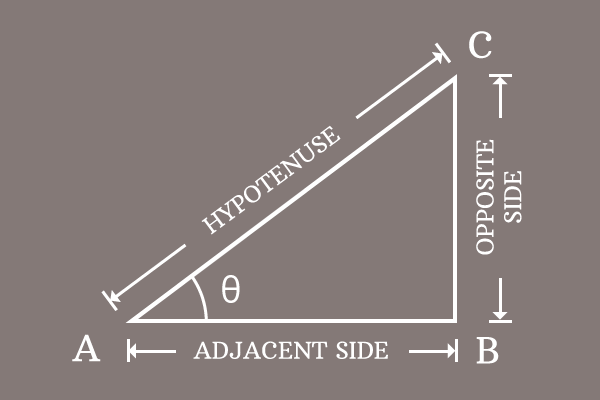A term that represents a ratio of lengths of hypotenuse to opposite side at an angle of a right triangle is called the cosecant.
Cosecant is a name and it is introduced in trigonometry mathematics to denote the ratio of lengths of hypotenuse to opposite side at a particular angle in a right triangle. It is generally written in ratio form and also written as cosecant with angle in alternate way.
The value of cosecant at an angle is calculated by the ratio of lengths of hypotenuse to opposite side.
$\dfrac{Length \, of \, Hypotenuse}{Length \, of \, Opposite \, side}$
So, cosecant is often called as a trigonometric ratio in general.
The value of cosecant at an angle is written in alternative mathematical form by writing cosecant in its short form $\csc$ or $\operatorname{cosec}$ and then respective angle of the right triangle.
For example, if angle of a right angled triangle is represented by $x$, then cosecant of angle $x$ is written as $\csc{x}$ or $\operatorname{cosec}{x}$ in trigonometry. $\csc{x}$ or $\operatorname{cosec}{x}$ is a function form. Hence, it is generally called as cosecant function in mathematics.
Thus, cosecant functions like $\csc{A}$, $\csc{\alpha}$, $\csc{\beta}$, and etc. are defined in trigonometric mathematics.
$\Delta CAB$ is a right triangle and its angle is denoted by theta ($\theta$).

cosecant of angle is written as $\csc{\theta}$ or $\operatorname{cosec}{\theta}$ in this case.
$\csc{\theta}$ (or) $\operatorname{cosec}{\theta}$ $\,=\, \dfrac{Length \, of \, Hypotenuse}{Length \, of \, Opposite \, side}$
It is often used as a formula to calculate the value of cosecant at any angle of the right triangle.
$AC$ is length of hypotenuse and $BC$ is length of opposite side (perpendicular) in this example.
$\,\,\, \therefore \,\,\,\,\,\,$ $\csc{\theta}$ (or) $\operatorname{cosec}{\theta}$ $\,=\, \dfrac{AC}{BC}$
The list of exact values of cosecant functions in fraction and decimal forms in a table with proofs.
A free math education service for students to learn every math concept easily, for teachers to teach mathematics understandably and for mathematicians to share their maths researching projects.
Copyright © 2012 - 2025 Math Doubts, All Rights Reserved